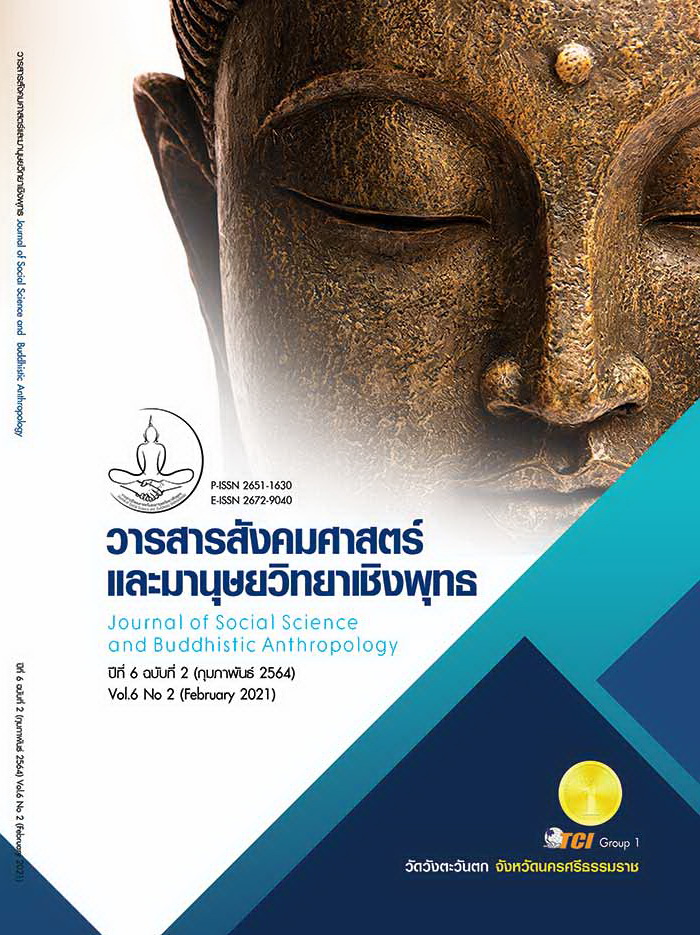THE INFLUENCE OF CLAUSAL AND GUIDELINES EFFICIENCY IN THE ADMINISTRATION PRACTICE OF EDUCATIONAL INSTITUTION ADMINISTRATORS IN THE AGE OF THAILAND 4.0
Keywords:
The Influence of Clausal, Management Efficiency, Educational Institution Administrators, Thailand 4.0Abstract
The Objectives of this research article were to study 1) to examine the causal model of leadership Strategic management Political factors and principles of governance influencing the administrative efficiency of school administrators in Thailand 4.0 2) To study ways to increase the management efficiency of school administrators in Thailand 4.0. This mixed method research combining quantitative and qualitative methods. For the quantitative research part, the sample consisted of 360 teachers who had at least one year of teaching experience and worked in schools in the Krungthon North Group, Bangkok Metropolitan Administration. They were selected via stratified sampling. Data were collected with the use of a questionnaire and analyzed with a structural equation model. As for the qualitative research component, in-depth interviews were conducted with 21 key informants including educational institution administrators and deputy directors of schools in the Krungthon North Group which were under the supervision of Bangkok Metropolitan Administration. They were selected by purposive sampling. The data were analyzed by using frequency, percentage, mean and standard deviation. Find relationships between factors with a structural equation model. The research findings showed that: 1) To examine the causal model of leadership Strategic management Political factors and principles of good governance It is related to the administrative efficiency of the school administrators. In Thailand in the 4.0 , the results of data analysis showed that There are only political factors and good governance principles. That have direct influence on management efficiency division of strategic Leadership and Management There is no direct influence on management efficiency. But indirectly influences management efficiency, so every variable has an influence on management efficiency.; and 2) Discover 5 solutions to the administration of educational institution administrators in Thailand in age 4.0.
References
กัลยา วานิชย์บัญชา. (2548). การใช้ SPSS for windows ในการวิเคราะห์ข้อมูล. กรุงเทพมหานคร: ภาควิชาสถิติ คณะพาณิชยศาสตร์และการบัญชี จุฬาลงกรณ์มหาวิทยาลัย.
กัลยารัตน์ เมธีวีรวงศ์. (2559). การพัฒนาตัวบ่งชี้ภาวะผู้นำครูโรงเรียนมาตรฐานสากล. ใน วิทยานิพนธ์การศึกษาดุษฎีบัณฑิต สาขาวิชาการบริหารการศึกษา. มหาวิทยาลัยศรีนครินทรวิโรฒ.
จรูญเกียรติ กุลสอน และคณะ. (2559). ปัจจัยที่ส่งผลต่อประสิทธิภาพการบริหารจัดการระบบเทคโนโลยีสารสนเทศในโรงเรียน. วารสารวิชาการและวิจัยสังคมศาสตร์, 11(พิเศษ), 1 - 12.
จันทรรัตน สิทธิสมจินต์ และคณะ. (2557). กลยุทธ์การบริหารงานห้องสมุดมหาวิทยาลัยสู่องค์การสมรรถนะสูง: กรณีศึกษาห้องสมุดมหาวิทยาลัยขอนแก่น. วารสารห้องสมุด, 58(1), 1-13.
จันทิมา บุญอนันต์วงศ์. (2560). การวิเคราะห์องค์ประกอบของรูปแบบการบริหารเชิงกลยุทธ์ของโรงเรียนมัธยมศึกษาสังกัดสำนักงานคณะกรรมการการศึกษาขั้นพื้นฐาน. วารสารวิทยาลัยดุสิตธานี, 11(2), 318-333.
จินดาขวัญ ถิ่นวงษ์แดง และปิยะนาถ บุญมีพิพิธ. (2561). ปัจจัยที่ส่งผลต่อประสิทธิภาพการบริหารงานของผู้บริหาร สถานศึกษา สังกัดสำนักงานเขตพื้นที่การศึกษาประถมศึกษานครปฐม เขต 1. วารสารวิชาการ มหาวิทยาลัยอีสเทิร์นเอเชีย ฉบับสังคมศาสตร์และมนุษยศาสตร์, 8(3), 179-189.
ชัยศักดิ์ ศุกระกาญจน์. (2561). ภาวะผู้นำของผู้บริหารองค์การในยุค THAILAND 4.0. เรียกใช้เมื่อ 1 สิงหาคม 2562 จาก https://spark.adobe.com/page/YlGxuPO3qkdtE/
ปณิธาน กมลเศษ และคณะ. (2560). หลักธรรมาภิบาลที่ส่งผลต่อการบริหารงานบุคคลของ ผู้บริหารสถานศึกษาเอกชนในจังหวัดร้อยเอ็ด. วารสารบัณฑิตศึกษา มหาวิทยาลัยราชภัฏสกลนคร, 14(65), 125-134.
ปุณตนนท์ เถียรประภากุล. (2561). ภาวะผู้นำของผู้บริหารสถานศึกษาในยุคการศึกษา 4.0. Veridian E-Journal Slipakorn University ฉบับภาษาไทย สาขามนุษยศาสตร์ สังคมศาสตร์ และศิลปะ, 11(2), 1994 - 2013.
รายงานการจัดการศึกษาของกรุงเทพมหานคร. (2561). เรียกใช้เมื่อ 25 สิงหาคม 2563 จาก http://www.bangkok.go.th /bang kokeducation/page/sub/10030
สกาวเดือน พิมพิศาล และคณะ. (2558). ภาวะผู้นำการเปลี่ยนแปลงเพื่อพัฒนาองค์กรสถาบันการศึกษาภายใต้ธรรมาภิบาล. วารสารวิชาการแพรวากาฬสินธุ์ มหาวิทยาลัยราชภัฏกาฬสินธุ์, 2(1), 37-60.
สุกัญญา รอดระกำ. (2561). บทบาทผู้บริหารสถานศึกษาในยุคไทยแลนด 4.0 การประชุมวิชาการเสนอผลงานวิจัย ระดับชาติ. มหาวิทยาลัยราชภัฏสวนสุนันทา.
สุพจน์ นันทะเทศ และคณะ. (2016). สภาพปัญหาและแนวทางการพัฒนาการบริหารงบประมาณของสถานศึกษาขั้น พื้นฐาน สังกัดสำนักงานเขตพื้นที่การศึกษาประถมศึกษาสระแก้ว เขต 2. วารสารบัณฑิตศึกษามหาวิทยาลัยราชภัฏสกลนคร, 13(61), 225-242.
สุภัทรา สงครามศรี และคณะ. (2559). แบบจำลองความสัมพันธ์ของภาวะผู้นำเชิงกล ยุทธ์ ประสิทธิภาพการจัดการทรัพยากรมนุษย์ และผลการปฏิบัติงานของสถาบันอาชีวศึกษา. วารสารเทคโนโลยีสุรนารี, 10(1), 41 - 64.
Kline, R. B. (2005). Principle and practice of structural equation modeling. NY: Guilford.
Moorhead G, & Griffin R. (1995). Organizational Behavior: Managing People and Organizations. Boston: Houghton Mifflin.
Phusalux, et al. (2015). Structural Equation Modeling of Determinants on Management Effectiveness of Thai Private Vocational College Education. Retrieved 26 August 2020 form https://www. researchgate.net/scientific-contributions/Urasa-Buatama-2064089908









